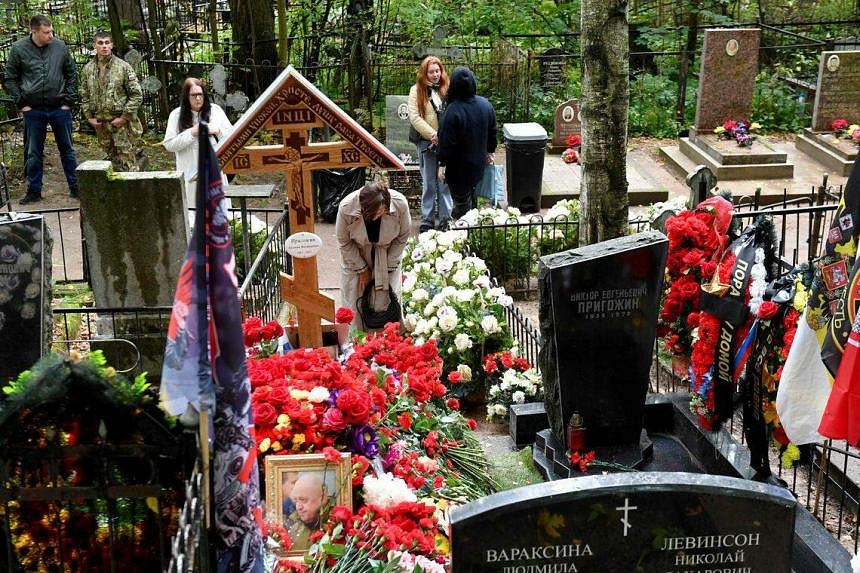MOSCOW - At memorials to Wagner chief Yevgeny Prigozhin, who was killed in an unexplained plane crash exactly 40 days ago, dozens of mourners hailed the mutinous mercenary leader as a patriotic hero of Russia who had spoken to truth to power.
Mr Prigozhin was travelling to St Petersburg in a private Embraer jet on Aug 23.
It crashed north of Moscow, killing all 10 people on board.
They also included two other top Wagner figures, Mr Prigozhin’s four bodyguards and a crew of three.
It is still unclear what caused the plane to crash.
The incident occurred two months to the day since Mr Prigozhin’s failed mutiny.
The Kremlin said on Aug 30 that investigators were considering the possibility that the plane was downed on purpose.
At his grave in the former imperial capital of St Petersburg, his mother, Violetta, and his son, Pavel, laid flowers.
Supporters waved the black flags of Wagner which sport a skull and the motto “Blood, Honour, Motherland, Courage”.
In eastern Orthodoxy, it is believed that the soul makes its final journey to either heaven or hell on the 40th day after death.
At memorials in Moscow and other Russian cities, dozens of Wagner fighters and ordinary Russians paid their respects, though there was no mass outpouring of grief. Russian state television was silent.
“He can be criticised for certain events, but he was a patriot who defended the motherland’s interests on different continents,” Wagner’s recruitment arm said in a statement on Telegram.
“He was charismatic and importantly he was close to the fighters and to the people. And that’s why he became popular both in Russia and abroad,” it said.
Mr Prigozhin’s mutiny posed the biggest challenge to President Vladimir Putin’s rule since the former KGB spy rose to power in 1999.
Western diplomats say it exposed the strains on Russia of the war in Ukraine.
‘Leader’
After months of insulting Mr Putin’s top brass with a variety of crude expletives and prison slang over their perceived failure to fight the Ukraine war properly, Mr Prigozhin took control of the southern city of Rostov in late June.
His fighters shot down a number of Russian aircraft, killing their pilots, and advanced towards Moscow before turning back 200km from the capital.
Mr Putin initially cast Mr Prigozhin as a traitor whose mutiny could have tipped Russia into civil war, though he later did a deal with him to defuse the crisis.
Mourners spoke of respect for Mr Prigozhin.
“He was a real authority, a leader,” Mikhail, a serviceman in Russia’s armed forces who refused to give his second name, told Reuters.

Moscow resident Marta, who also refused to give her surname, said the people believed in Mr Prigozhin but that Wagner had been “decapitated” by the deaths of him and co-founder Dmitry Utkin.
“Hope for justice died with him,” she said. “People believed in him.”
Pro-Wagner groups posted a video of Mr Prigozhin flying to Mali where, after a thunderstorm, he met a senior commander known by his call sign “Lotus” – Anton Yelizarov – who is now reported to be leading the group.
Opponents such as the United States cast Wagner as a brutal crime group which plundered African states and meted out sledgehammer deaths to those who challenged it.
Mr Putin was on Friday shown meeting one of the most senior former commanders of the Wagner mercenary group and discussing how best to use “volunteer units” in the Ukraine war. REUTERS


